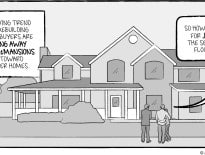For many Boston residents, there are two essential pieces of equipment for parking your car in the winter: a snow shovel to dig out after a storm and a summer beach chair to preserve your on-street parking space. Parking throughout the city is a serious challenge for residents, visitors and the business community, but the current parking crunch is likely to intensify with the expected increase in population, economic growth and construction of new buildings over existing parking lot areas. We need to start reexamining the parking management policies of city government to find new, innovative solutions, if we want to avoid seeing parking becoming a larger problem for everyone in Boston. This image of summer beach chairs, orange cones or even lawn furniture saving a parking spot is a common symbol of Boston’s winter routine, but it should also be a reminder that our entire parking policy is ready for an update.
A Better City recently completed a report called the “Future of Parking in Boston,” where we worked with the city of Boston for the past year looking at best parking practices from around the nation. The report offers concrete strategies for increasing the accessibility and efficiency of parking, supporting zoning amendments that would reduce parking demand and improving efficiency of parking management. This study provides evidence of how some current parking policies have a negative impact on local economic development, including how high parking construction costs drive up the overall cost of housing, services and goods in Boston.
The Cost Of Parking Construction Is Hurting Our Economy
Building additional parking spaces is not always the best solution, particularly because it is expensive. In downtown Boston, the cost of parking construction is twice the national average on a per space basis. This is contributing to the high cost of housing in Boston, especially through new developments. The report calls for unbundling parking in commercial and residential leases to reduce housing costs for households. By requiring parking to be purchased or leased separately, it would reveal the true cost of storing a car to employers and property owners, and encourage shared parking availability.
Also, zoning changes are also necessary to minimize parking requirements in commercial and residential buildings. The direct cost of building one structured parking space is more than $21,000, which contributes to the cost of creating affordable housing units. Decreasing the requirements to developers on parking spaces will help lower the cost of overall new housing units, and assist with Boston’s goal of adding 53,000 affordable units by 2030.
On-street parking at metered sites are very important to small businesses. Recently Boston Mayor Marty Walsh announced a yearlong experiment that may dramatically change the way Boston treats the price of on-street parking meters – an idea raised by our report. Parking meter rates in specific areas of the Back Bay and Seaport District will now implement a flexible pricing model, so that the meter price of parking will change throughout 2017 depending on the overall demand. In the Seaport, meter rates on some streets will decrease, to encourage parking in those lower-demand areas.
Curbside space is one of our most valuable assets. Convenient and accessible on-street spaces in business districts can allow potential customers to get from their car to a store quickly and encourage frequent visits. When a single car occupies a meter space for the entire day, it represents an inefficient use of the space and is a deterrent to local businesses. If we properly adjust the price for certain parking meters, the city of Boston expects to actually increase the availability of parking spaces open to the public through higher turnover of spaces. Also, the rates for a parking meter in Boston are currently below the market value, at $1.25 per hour and much lower than the prices in our rival cities. Parking for an hour costs between $3.50 and $5 in New York, $6 in San Francisco and $6.50 in Chicago. The new technology in Boston’s smart parking meters can be programed and evaluated by the Boston Transportation Department to test the impact of different parking rates in these two high-demand neighborhoods and hopefully guide effective parking management plans in future years.
Modern Strategies To Improve Residential Neighborhoods
Finally, there are new strategies for parking in neighborhoods. The number of residential parking permits issued in Boston has increased by 24 percent since 2006, a level of growth that is unsustainable. It is possible that this number is growing because of abuse, as we learned that many have more than five parking permits registered for each household resident. A review of the resident sticker program and potential changes to the cost of a permit can help to make sure that access to the limited residential spaces are being used properly.
Fortunately, the future residents of Boston and urban areas in general will have a different relationship with their cars. Advancements in technology and new transportation services are making it easier to live in Boston without owning a vehicle. Our policies need to start reflecting and encouraging this reality. We must encourage this trend by providing for different mobility options in all neighborhoods, such as spaces for car-sharing services, vanpools and bicycles. Fewer cars on the road will also partner well with the Boston Climate Action plan and reduce mobile source pollution.
The truth is parking a car is never easy in Boston. We will always need the snow shovel, and probably the beach chair, but the report’s proven strategies with parking will make parking spots more available and fair, while promoting economic development and improving our quality of life.
Rick Dimino is president and CEO of A Better City.




 |
| 


